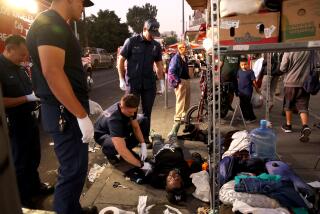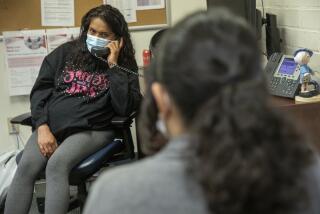A Poodle’s Poor Manicure and Other Outrageous 911 Calls
When Mark Whichard got to the CHP communications center the day after Christmas to handle 911 calls, he knew he was in for a workout. Only three of the 13 positions were filled, thanks to vacations and people calling in sick.
“It translates into calls not getting answered,” says Whichard, a 47-year-old Monrovia resident who didn’t catch his breath for several hours that morning.
That’s right. You punch in 911, and it’s dial-a-prayer. And it happens even when more of Whichard’s colleagues help man the battle stations because there are too many people with cell phones and too few people on the other end of the line.
In October, I wrote about two women who witnessed serious car accidents in Los Angeles and couldn’t get through to 911. In one case, a motorist died at the scene. Dozens of readers have shared similar 911 frustrations since then, and Whichard has kept me plugged into the bunker scene at the CHP communications center in Los Angeles, where Vermont Avenue meets the Hollywood Freeway. In California, all 911 calls from cell phones go through the Highway Patrol.
“You get a call every eight seconds. It never stops, you never get a chance to rest, and the number of calls is increasing on a daily basis,” Whichard says. “Let me tell you how stressful it is. My supervisor took me to the emergency room last Tuesday because I was experiencing chest pains.”
Some fresh bodies showed up four hours into Whichard’s Dec. 26 shift, and he made it through another day without going into cardiac arrest. But Josie Ayala-Hodson, a 911 dispatcher in the Vallejo office, says dispatchers are screamed at daily by callers who are on hold several minutes, and sometimes as long as 20 minutes.
“They constantly tell us, ‘Somebody’s going to die!’ ” says Ayala-Hodson, who represents 700 dispatchers statewide and declares it’s time for the state to do something.
Like what, asks CHP Commissioner Dwight “Spike” Helmick. He sympathizes with dispatchers, but says they’re fools to think more money or bodies are on the way any time soon. One problem is that the CHP can’t keep the dispatchers it has. Once they’re trained, they jump to police agencies that pay up to one-third more than the starting CHP salary of $2,800 a month.
“I think it’s going to get nothing but worse,” Helmick says. “Maybe we ought to consider turning it over to the private sector.”
For the record, Helmick says the Dec. 26 staffing shortage at the CHP’s L.A. office was “a scheduling screw-up” and not a routine occurrence. He claimed no 911 calls went unanswered that morning.
How can he know for sure? It’s possible that callers got tired of being on hold and hung up. In September, according to the CHP, one-third of 911 calls took more than a minute to answer.
Frankly, given the life-and-death nature of the problem, Helmick ought to get hold of the governor or someone in the Legislature and do something about it. But having said that, it’s becoming painfully clear that this is less about the failure of government than about the death of common sense.
“I’d say five or six of every 10 calls you get, nobody’s there,” Whichard says. “You can sometimes answer 10 or 15 calls in a row, and nobody’s there.”
Why? Because a lot of people will drop a cell phone into a glove box or the bottom of a purse, hitting a pre-programmed button that automatically dials 911 and clogs the lines. Whichard has heard coins dropping into the bottoms of purses, and he’s heard babies cooing as they play with a cell phone mom or dad has just handed them. He’s also had people dial 911 just for the fun of it, or to see if it really works.
Clearly, the republic is doomed. I knew it the moment cell phones went designer, if not the first time I saw a 10-year-old with one. In the culture of clueless self-absorption, you can keep the phone on in movie theaters and dial 911 for a case of the hiccups.
Every day the sun rises in California, thousands of citizens use cell phones to dial 911 for directions, weather reports and other frivolous information. In my first column on the subject, I suggested it might be a good idea to find these people and cane them. As I hear more stories, I realize I was being too soft.
“I got one call from a woman complaining about a bad manicure for her poodle,” Whichard says. “It’s hard to keep your tongue inside your mouth because these people are so stupid and have absolutely no consideration for the world around them and the possibility that someone might have an actual emergency. It’s bad enough that they don’t know the difference between Bakersfield and San Diego, but you have to practically beat information out of people to find out where they are, and then you find that their emergency is nothing but sheer stupidity.”
There’s a $200 fine for frivolous 911 calls. But it’s impossible to track culprits using cell phones until new technology is in place, and wireless carriers have bullied regulators into extending a 2001 deadline to 2005.
Helmick says the state has run several campaigns to inform dunderheads that 911 is only for true emergencies. Billboards, public service announcements and warnings in phone bills have all been tried, but these smart bombs have not penetrated the helmets of their intended targets.
Maybe it’s worth one more try. I see a TV spot with Whichard taking a call from the woman with the poodle.
In the meantime, my best advice, other than taking a ball-peen hammer to the cell phones of acquaintances who aren’t too bright, is that you program the seven-digit phone numbers of police departments in your area in case 911 is jammed when you’ve got an emergency. It could save your life.
*
Steve Lopez writes Mondays, Wednesdays and Fridays. He can be reached at steve.lopez@latimes.com.
More to Read
Sign up for Essential California
The most important California stories and recommendations in your inbox every morning.
You may occasionally receive promotional content from the Los Angeles Times.










